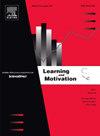Investigating the impact of immediate vs. delayed feedback timing on motivation and language learning outcomes in online education: Perspectives from Feedback Intervention Theory
IF 1.7
4区 心理学
Q3 PSYCHOLOGY, BIOLOGICAL
引用次数: 0
Abstract
Despite extensive research on feedback in language learning, a notable gap persists regarding the influence of feedback timing—specifically immediate versus delayed—on motivation and learning outcomes in online education, particularly among Chinese EFL learners. This study addressed this gap by examining the effects of feedback timing on motivation and language learning outcomes within the context of China’s online learning environment, employing Feedback Intervention Theory (FIT) as its theoretical foundation. The research involved an experimental design with 98 intermediate EFL students, randomly allocated to three groups: an immediate feedback group (IFG), a delayed feedback group (DFG), and a no-feedback group (NFG). Participants completed pretests assessing motivation and English proficiency, followed by an educational task tailored to their assigned feedback condition. Posttests measured changes in motivation and language learning outcomes, with one-way ANOVA applied to analyze differences across groups. Findings revealed that both immediate and delayed feedback significantly enhanced motivation and language learning outcomes compared to the no-feedback condition, though no substantial differences emerged between IFG and DFG. These results indicate that integrating timely feedback into online education can effectively support Chinese EFL learners’ motivation and language learning outcomes.
调查即时与延迟反馈时间对在线教育动机和语言学习结果的影响:来自反馈干预理论的视角
尽管对语言学习中的反馈进行了广泛的研究,但在反馈时间(特别是即时反馈和延迟反馈)对在线教育动机和学习结果的影响方面,特别是在中国英语学习者中,仍然存在显著的差距。本研究采用反馈干预理论(FIT)作为理论基础,考察了中国在线学习环境下反馈时间对动机和语言学习结果的影响,从而解决了这一空白。本研究采用实验设计,将98名中级英语学生随机分为三组:即时反馈组(IFG)、延迟反馈组(DFG)和无反馈组(NFG)。参与者完成了评估动机和英语水平的预测试,然后是根据他们指定的反馈条件量身定制的教育任务。后测测量动机和语言学习结果的变化,采用单因素方差分析分析各组之间的差异。研究结果显示,与无反馈条件相比,即时反馈和延迟反馈都显著增强了动机和语言学习结果,尽管IFG和DFG之间没有实质性差异。这些结果表明,将及时反馈融入在线教育可以有效地支持中国英语学习者的学习动机和语言学习成果。
本文章由计算机程序翻译,如有差异,请以英文原文为准。
求助全文
约1分钟内获得全文
求助全文
来源期刊

Learning and Motivation
Multiple-
CiteScore
2.90
自引率
0.00%
发文量
53
期刊介绍:
Learning and Motivation features original experimental research devoted to the analysis of basic phenomena and mechanisms of learning, memory, and motivation. These studies, involving either animal or human subjects, examine behavioral, biological, and evolutionary influences on the learning and motivation processes, and often report on an integrated series of experiments that advance knowledge in this field. Theoretical papers and shorter reports are also considered.
 求助内容:
求助内容: 应助结果提醒方式:
应助结果提醒方式:


